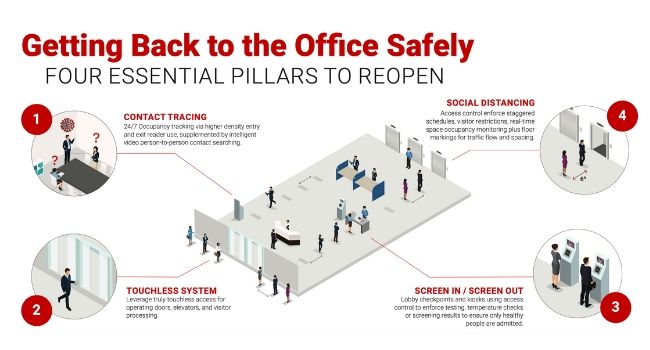
Kastle Systems Launches Comprehensive, Integrated COVID-19 Safety Program for Office Buildings and Suites
KastleSafeSpaces platform for critical contact tracing and screening technology protects tenants building-wide
As American companies and employees grapple with when and how to return safely to their workplaces, Kastle Systems, the country’s largest managed security services provider to commercial businesses, has developed an integrated, building-wide plan to safeguard the health and safety of workers returning to the workplace. The comprehensive system will enable office buildings to play a significant role in screening and contact tracing.
Kastle has combined decades of security experience with best practices around managing the novel coronavirus to introduce KastleSafeSpaces, which lets workplaces re-open by making their spaces smarter and safer, while maintaining a level of convenience that’s enabled by technology. Kastle is a leader in the building security sector. Its technology is installed in more than 3,600 buildings and 41,000 businesses across 47 states.
Using touchless access control, video analytics technology and thermal cameras, KastleSafeSpaces is a new system that integrates virus-screening and contact tracing processes to confidently facilitate a safe return to the office.
Kastle Chairman Mark Ein said, "For American workers to return safely back into office buildings, there must be a comprehensive system in place that integrates technology and new safety protocols both for the building and for tenant spaces alike. It can't be every building owner, tenant and occupant for themselves. We are all in the business of public health now to protect each other’s lives and help America get back to work."
Kastle's approach focuses on integrating technology with new processes to immediately accelerate four major shifts happening within buildings. The combined pillars of safety and security, much of which is available in current building security systems but not fully activated, include:
Shift One: Everything Is Touchless
Touchless controls and an integrated app on smartphones will be the new standard throughout office buildings. New KastleSafeSpaces technologies will enable wireless, hands-free door opening, turnstiles, elevators, security card readers, visitor kiosks and parking ticket vending machines.
Shift Two: Screen In & Screen Out
KastleSafeSpaces will facilitate daily screenings of employees, vendors and visitors, fully integrating with the security access control system to screen out those presenting with symptoms or known to be infected. As the availability of testing increases, those carrying antibodies or testing negative for the virus will screen in and be allowed access. Many office lobbies will start to resemble airports with testing stations, screening queues, speed lanes, designated check-in times and self-check kiosks. Kastle Systems will work closely with human resources departments to protect the privacy and health care data of all tenants and workers within a building.
Shift Three: Occupancy Monitoring for Contact Tracing
KastleSafeSpaces will utilize existing access control systems as a powerful tool to make contact tracing as simple as possible by mandating credential use for entry and exit traffic for buildings, floors, tenant office suites and common areas at all times. Proximity data can be supplemented by intelligent video technology to investigate close personal contact for more detailed tracking. If an employee tests positive for Covid-19, people who are impacted can be easily notified through the Kastle app.
Shift Four: Social Distancing
KastleSafeSpaces will use data and technology-led reminders to supplement physical guides to reinforce social distancing. Access control data can help to “flatten the arrival curve” and to monitor and manage real-time space occupancy to ensure safe distance for employees, vendors, and visitors, while also enforcing any policies to limit visitors. New installations, like safeguard stations and checkpoints, will maintain the recommended social distancing guidance and new floor markings will not only indicate the flow of traffic but reinforce how far employees, vendors and visitors should stand away from each other for maximum health and safety. Real-time data exception reporting will provide notifications for issues such as floor-level occupancy, suggesting the need for greater social distancing if the number of people in a space is too high. Utilizing access control, Kastle will work with tenants to enforce staggered work schedules to minimize density.
"As much thought needs to go into planning for how people get back to work in offices as to when they should start doing so. A comprehensive, tech-smart approach to security, safety and public health can provide the right on-ramp for businesses and the economy to take off," added Haniel Lynn, Kastle CEO.